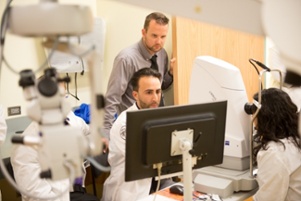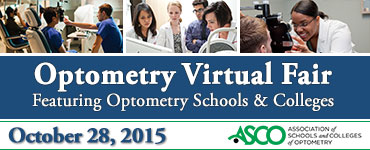Want to Learn about an Optometry School? The Best Way to Be in the Know is to Go!
In this month’s Eye on Optometry blog post, we address campus visits. If you’re considering applying to optometry school, visiting the campuses of the schools and colleges of optometry you think you’d like to attend is a crucial part of the process. There are plenty of opportunities to do so!
Most if not all of the schools and colleges of optometry have at least one open house, and often more, each year. They’re usually handled by the Admissions Office, Student Affairs Office or similar department, are announced on the schools’ websites, and require an RSVP/reservation. However, most of the schools and colleges of optometry also welcome visitors at any time, allowing them to call and schedule a visit and tour at their convenience. “We love to have future applicants, current applicants and their families and friends visit us anytime,” says Lyle Tate, Admissions Program Manager for the University of Houston College of Optometry (UHCO). “Our Office of Optometry Relations can arrange for an advisor visit and tour whenever it’s most convenient for our guests.” And it’s never too early to visit, he says. “We welcome high school students and undergrads alike.”
In addition to open houses and individual visits, “Many schools offer intensive summer programs to help prepare students for the admissions process and the rigor of the professional program,” notes Kristine Benne, MA, Assistant Dean, Student Affairs, University of the Incarnate Word Rosenberg School of Optometry (RSO).
Can’t I Learn Everything about Optometry School Online?
Ideally, you’ll make it a point to visit at least your top one or two school choices in person. According to Tate, “There’s really a world of difference between what you can learn online and what you can experience in person at any school or college of optometry. A visit is an opportunity to get a feeling of the culture of a program.

The majority of students attending the University of Houston College of Optometry live off campus, but some live at Calhoun Lofts, an on-campus residence facility that is in part dedicated to graduate and professional school students. The lofts are located just a couple of blocks from the UHCO building. (Photo courtesy of University of Houston)
For example, what that means at UHCO is, among other things, inclusiveness, collaboration in both classroom and clinical environments, a supportive family atmosphere, exposure to a diverse patient population and a commitment to providing students the best access to top-notch technology.”
Kurt Thiede, Executive Director of Enrollment Management at New England College of Optometry (NECO), agrees. “A visit gives prospective students a sense of the character and tone of a campus and provides a very tangible idea of what the day-to-day experience at a particular school will be like,” he says. “Even with the many ways students can now acquire information, to date no one has created a virtual experience that matches the on-site physical visit. ‘Feeling’ the place is a very important part of candidates’ final decisions on what school to attend, and ultimately their satisfaction with their education within a particular campus community.”

Students and faculty at the University of the Incarnate Word Rosenberg School of Optometry’s Bowden Eye Care and Health Center review optical coherence tomography results.
Students and faculty at the University of the Incarnate Word Rosenberg School of Optometry’s Bowden Eye Care and Health Center review optical coherence tomography results.Along the same lines, Benne encourages students to observe the overall culture of the campus when they visit. She recommends paying attention to how staff, students and faculty interact as well as whether the school’s stated mission and message are expressed in the day-to-day interactions and activities on campus. During a visit, she says, “The prospective student can best determine if there is congruence between the recruitment message and the school environment and whether he or she feels welcomed and comfortable.
Who to Talk to, What to See During Your Visit to a School or College of Optometry

University of Houston College of Optometry students during the annual Student Texas Optometric Association softball fundraiser. (Photo by David Gee, UHCO Office of Optometry Relations)
Scheduled on-campus open houses typically include a tour and presentations on many important topics, such as what the program has to offer, the admissions process, the Optometry Admission Test, financial aid, student organizations and career options. Often, a Q&A session with a panel of current students is part of the day. But whatever type of visit you’re taking advantage of, interacting with and asking questions of current students is highly recommended. Explains UHCO’s Tate, “Even though we as student affairs personnel provide great information, there’s no topping a sit-down visit with current students to learn what it’s really like, how they transitioned to the professional school world, how they recommend preparing for optometry school, and so much more. They’re truly an applicant’s best resource many times.”
Other people who are helpful to meet with during a campus visit whenever possible are academic and financial aid advisors, administrators, and didactic and clinical faculty members. It’s also a good idea to find out whether you can walk through clinics, observe classes, get any hands-on experiences, such as in skills labs, visit other key buildings, such as libraries, and see housing options and social spots on or near campus.
Questions to Ask
The questions you ask during your visit to a school or college of optometry may depend somewhat on how close you are to applying to optometry school. For example, a high school student may want to ask different questions than someone who is closer to applying, or someone who already has a family. Regardless of your specific current situation, here are some good ones:
- what are the current academic prerequisites?
- what are the strongly recommended courses? (According to RSO’s Benne, “Although not required, many times taking the recommended courses can truly help a student succeed in the professional program.”)
- what emphasis is placed on shadowing experience; does the school have a minimum number of hours? (Benne notes that “Regardless of a minimum number of hours, all prospective students should begin shadowing a doctor of optometry early in their higher education careers if they have not done so before. This helps develop their passion and interest in the profession and looks good on the application.”)
- what do I need to know about the key parts of the application process, such as deadlines, the personal statement and letters of evaluation? (See also OptomCAS.)
- what are the attributes of a candidate who will be strongly considered for admission?
- if you’ve been invited to campus for an admissions interview: what is the general agenda on interview day, is the interview open- or closed-file, how many faculty/admissions committee
members do I interview with, what is the process once the interview is over, how quickly will I be notified of the admissions decision, how long do I have to make my decision, how do I reserve my space in the class? - what will my first semester be like?
- what is the balance of classroom/lab and clinic time during the doctor of optometry program?
- at what point in the program will I start working with patients?
- how diverse is the patient population seen in your clinic(s)?
- what type of support is available for helping me to succeed academically and otherwise?
- are there study/prep opportunities as I prepare for Boards?
- do you offer practice management courses?
- what is your externship/fourth-year rotations process like?
- what faculty mentorship and/or research opportunities does the school offer?
- what student organizations and clubs can I join?
- are there service or mission trip opportunities?
- what financial aid/support is available to me?
- what are the options for living arrangements; do most students live on or off campus?
- what is the ‘personality’ of the surrounding city or town?
- where do students hang out and otherwise socialize?
- what residency programs is the school affiliated with?
- what types of programs and or communication does the school provide to help me find a job leading up to and after graduation?
Before and After Your Visit to Campus

A group of students meets at the George W. Brackenridge Library at the Rosenberg School of Optometry.
In order to maximize your campus visit opportunity, NECO’s Thiede recommends that you learn as much basic information as you can about a school or college, i.e., the “facts and figures,” before you make the trip, allowing time for more substantial questions while you’re there. And Benne offers further advice on preparing for your visit to a school or college of optometry: “All 21 schools of optometry are strong and governed by accreditation criteria, which ensures a similar standard of education. However, how each school delivers the optometric education and what the school or college focuses on can be keys to determining if the program is the right fit for you. Reflect on what you value as part of your future optometric education experience and tailor your questions to how your top-choice schools provide opportunities in those areas.”
Benne also points out that the RSO admissions or student affairs team can typically put a prospective student in contact with a current student for long-term communication and help with questions that may arise after a campus visit is over. Same for UHCO, whether it’s officially or not officially arranged, as Tate mentions, “Our students will stop in the hallways when they see a guest visiting and offer their e-mail addresses and phone numbers just in case the guest wants to follow-up with more questions.”
Try the Optometry Virtual Fair

More Information:
For specific information about Open Houses or to schedule an individual visit, please find a list of schools here or contact them directly.





